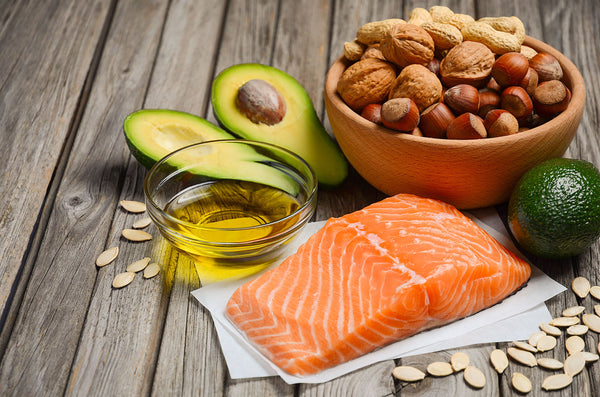
What You’ve Been Getting Wrong About the Phrase “You Are What You Eat”
Share
“You are what you eat.” You know the phrase. Simple concept, right? While it’s certainly true that the food we put into our bodies has a major effect on our overall health, research is proving we need to take this a step further in order to truly benefit from eating healthily and zero in on foods that are good for our gut. In this sense, it’s not quite “you are what you eat,” but more a case of “you are what you feed your gut.” Every food choice we make affects the billions of bacteria living in our colon. While this may sound daunting at first, armed with a few simple diet swaps and the knowledge of foods to avoid, you can significantly improve your gut health — boosting not only your digestion, but also your mood and energy in the process.
Gut Heroes to the Rescue
Enter probiotics and prebiotics, our favorite gut hero dynamic duo. Most people are somewhat familiar with the former, as there has been steady buzz around fermented food and drink for a while now in the health world. Some examples of probiotic foods include yogurt, kimchi (fermented cabbage, a traditional Korean dish that is much tastier than it sounds!) and the increasingly popular kefir (a milk drink derived from kefir grains) — all of which are examples of naturally fermented foods that offer serious probiotic benefits. In comparison, “prebiotic” is a fiber that passes through the small intestine undigested and becomes fermented when it reaches the large colon. Green or unripe bananas, apples, Jerusalem artichokes and barley are all examples of prebiotic foods and are packed with resistant starch that has been proven to significantly improve bowel movement, reduce bad bacteria and support the overall function of the gut.
The Search for the Right Gut Microbiome Diet for You
While the aforementioned foods are the standard recommendations for gut health, it is important to personalize your nutrition plan based on your individual needs. If you suffer from an irritated digestive system, some of the recommended foods may be best avoided (at least until your gut microbiome has been rebooted.) Garlic, while rich in the natural prebiotic fructooligosaccharides, or FOS, is also classified as a high FODMAP. Foods that are high FODMAP are notorious for triggering unwanted digestive symptoms such as bloating, gas and stomach pain. Those struggling with digestive issues are often placed on a diet specifically created to temporarily cut out such foods in order to rule out and identify which of them their gut can’t handle. It’s not recommended to partake in the FODMAP diet without guidance from a registered dietician, but you can learn more about it here:
https://www.monash.edu/medicine/ccs/gastroenterology/fodmap
Similar to the FODMAP diet, there is another diet designed by holistic doctor Raphael Kellman, M.D. specifically for gut microbiome. In his book “The Microbiome Diet: The Scientifically Proven Way to Restore Your Gut Health and Achieve Permanent Weight Loss,”[1] Dr. Kellman suggests a three-phase approach: three weeks of elimination in Phase 1 involving cutting out foods that are detrimental to gut health, followed by a four-week reintroduction period for Phase 2, and finally a "lifetime tune-up" for Phase 3, which requires being intuitive about foods to find the ones that are most compatible with your body and health.[2]
The steps in this method are similar to the low FODMAP diet. Both share the same method of establishing what our gut can tolerate by giving our digestive system a chance to detox by temporarily cutting out foods causing gut sensitivity. Put simply, these gut microbiome diets encourage eating probiotic- and prebiotic-rich foods.
Watch Out for Gut Villains
Now that we’ve covered the types of food we should be adding to our diet for optimal gut health, what about the foods we should we be avoiding? Unfortunately, there are a few gut “villains” out there slowing down the digestion process, killing good bacteria and causing unwanted gut troubles — think bloating, cramping and toilet trouble! The main culprit? Alcohol. We know that high alcohol consumption can negatively affect our overall health, but it turns out that it can also cause unwanted changes to our gut microbiome. Similarly, artificial sweeteners are linked to alterations of our gut microflora and the inheritance of gluten intolerances. It is also a good idea to limit highly processed foods, food additives and an excess of red meat from our diets. Evidence suggests these types of food not only increase bad bacteria but could also be linked a wide variety of intestinal and digestive challenges.[3]
Don’t Forget the Trusty Sidekick: DPA
Unsurprisingly, improved gut health comes down to basic nutrition: increasing our intake of fiber-rich fruits and vegetables and reducing processed foods and alcohol. An important part of these basic nutrition steps is ensuring the correct fats are added to our diet. Research suggests a diet containing high amounts of saturated and trans-fat isn’t good for the gut, whereas enjoying unsaturated fats such as olive oil, avocado and oily fish actually helps our gut function.[4] This is where we stress the importance of including omega-3s (specifically DPA) in our diet. Studies have shown omega-3 fatty acids have various benefits for both body and brain.[5] These fatty acids are most commonly found in oily fish: mackerel, salmon, sardines and herring are just some excellent choices that will increase your unsaturated fat intake and help you experience the health benefits associated with omega-3s. If you are serious about your overall health and are interested in upping your omega-3 intake, specifically increasing your DPA consumption is essential.
After all is said and done, it seems that even after we cut out the foods hurting our microbiome and follow the gut-healthy nutrition guidelines, our bodies still need that extra boost to truly experience health benefits. Fish oil supplementation is an excellent way to increase your omega-3 intake when you don’t have the time or resources to follow a strict microbiome diet. Taking just two of our Aqua Biome™ fish oil soft gels daily (with food) can help your microbiome flourish. We pride ourselves on being the first fish oil in the world to feature the new “missing omega-3,” DPA. This breakthrough in omega-3 technology has opened the door for additional health benefits, with numerous studies proving that DPA is a distinctly powerful nutritional and therapeutic supplement. Our capsules are unique in that they are tested for 130 harmful environmental and industrial contaminants and toxins in an accredited, analytical chemistry laboratory. It is our belief that if you are going to take active steps to pursue a gut-friendly diet, you should also be using supplements you can depend on to support this.
To find out more, visit us here: https://enzymedica.com/collections/aquabiome-fish-oil
[1] https://www.amazon.com/Microbiome-Diet-Scientifically-Restore-Permanent/dp/0738218111
[2] https://kellmancenter.com/the-microbiome/
[3] https://www.ncbi.nlm.nih.gov/pmc/articles/PMC3444908/
[4] https://www.nutrition.org.uk/attachments/043_Oils%20and%20fats%20in%20the%20diet.pdf
[5] https://www.healthline.com/nutrition/omega-3-fish-oil-for-brain-health




